|
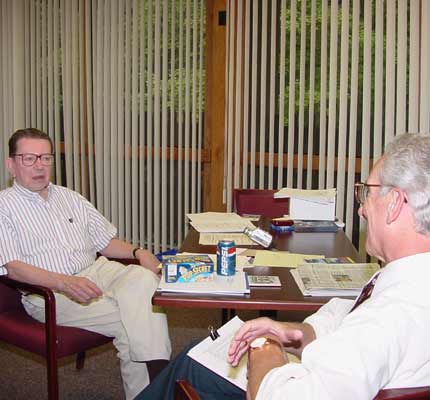 Al: Paul, I really appreciate being able to sit down
and talk. I have followed your long and storied career. I look forward to this
interview.
Al: Paul, I really appreciate being able to sit down
and talk. I have followed your long and storied career. I look forward to this
interview.
Paul: Before you do that, give me a sixty-second
biography of yourself and Ann.
Al: I was born in New Jersey but moved to Pittsburgh
in the early fifties. I went to Muskingum College, Pittsburgh Theological
Seminary, University of Edinburgh, Scotland, and McCormick Theological
Seminary. I'm an ordained Presbyterian minister.
Paul: Oh you are? One of my first books was a
biography of a Presbyterian minister, Elijah Lovejoy, the famous abolitionist.
Al: Ann and I live in Indiana. I am an adjunct
professor at DeVry and St. Francis. Ann and I met three years ago and were
married in 2000. Ann has two grown children and I have three.
Paul: So, you are newlyweds?
Al: Yes, we are. We got married in Bloomington,
Indiana at the Tibetan Cultural Center. The Center is run by the brother of the
Dali Lama. In fact, we went to Tibet, Nepal, and India to do some research for
my writing about the Tibetan people, culture, religion, and troubles that the
Tibetan people have with the Chinese occupation of their country.
Paul: Tibet is an illustration of where, it seems to
me, they ought to be able to express their religious and political views.
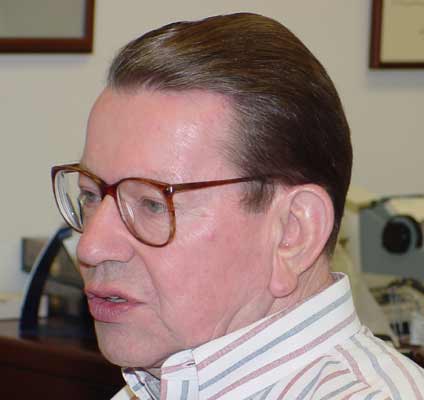 Al: I was listening to NPR coming here today, and
they were talking about the latest commotion in China regarding Taiwan. It
struck me how ironic it is that the Chinese have absolutely no business in
Tibet, but they are there. On the other hand, Taiwan should be a part of China,
but they aren't. Washington supports the latter and doesn't the former. It is
interesting how the US gets into these strange anachronisms.
Al: I was listening to NPR coming here today, and
they were talking about the latest commotion in China regarding Taiwan. It
struck me how ironic it is that the Chinese have absolutely no business in
Tibet, but they are there. On the other hand, Taiwan should be a part of China,
but they aren't. Washington supports the latter and doesn't the former. It is
interesting how the US gets into these strange anachronisms.
This brings me to the situation in the Middle East.
Over the past few months, we have witnessed a barrage of publicity from
Washington about the proposed war with Iraq. I would like to have your thoughts
about Bush's notion of a preemptive strike against one third of the Axis of
Evil.
Paul: First of all, there are many inconsistencies
with the Axis of Evil: North Korea, Iran, and Iraq. North Korea was starting to
negotiate with us under Clinton, and then George W. closed the door. Iran is
clearly moving in the right direction. They have elected a moderate as
president and are moving in our direction. There are other inconsistencies.
Two of those three countries any American can legally visit-Korea and Iran.
Now, Iraq you have to go through Jordan or someplace else to do it.
Technically, you may be prosecuted for doing it. However, an American can't
legally go to Cuba ninety-miles away. Who has a better human rights record,
China or Cuba? Clearly, Cuba's record isn't good, but it's better than
China's. What Washington is doing is pandering to domestic politics in the
shaping of foreign policy, and that's just not a wise thing to do.
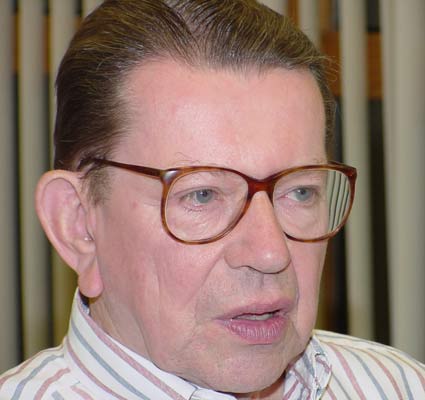 Al: What would you be saying in the Senate if you
were still there?
Al: What would you be saying in the Senate if you
were still there?
Paul: If I were in the Senate, I would be saying we
ought to stop all this nonsense of talk about invading Iraq. I'm opposed to
Saddam Hussein, and we ought to be pushing for international inspections. My
friends in the Pentagon tell me that it will take a minimum of 175,000 to
225,000 troops to carry out a land invasion. In addition, all kinds of innocent
Iraqis are going to be killed-even our sanctions program is killing all kinds of
Iraqis right now. It is not hurting Saddam Hussein. If we really want to topple Saddam, we should say nothing about it publicly and tell the CIA and
others along with Iraqis who want to change the government in Baghdad to get rid
of him.
Al: It's going to be hard to get the Kurds to do it
again having lost a lot the last time. Bush 1 promised them support and then
reneged.
Paul: I voted against Desert Storm. I thought we
should apply economic sanctions at that point as a means of changing the
government. I just think we have been very amateurish in the conduct of foreign
policy. My instinct, and I have not talked to Colin Powell since he's been
Secretary of State, but my instinct is that he understands what needs to be done,
but he has problems with the Defense Department and the White House staff. I
also understand that Dick Cheney is kind of back and forth between being in
Rumsfeld's corner and then Powell's.
 Al: I would like to broaden the question: I would
like to have your thoughts on the war in Afghanistan and the war on terrorism,
censorship, and all the detainees.
Al: I would like to broaden the question: I would
like to have your thoughts on the war in Afghanistan and the war on terrorism,
censorship, and all the detainees.
Paul: If there is one thing that we stand for is our
attention to civil liberties and freedom. In this "strange war," we grab these
people and detain them. We have detained hundreds of people in the United
States. The court just a couple of days ago said we have to release their
names. That's just kind of basic, and then what are they going to do
with these people?
Al: Many of them aren't even charged with something.
Paul: You just can't detain people indefinitely.
Then Alan Dershowitz, who is ordinarily sensitive on civil liberties, said right
after 9/11, that we are going to have to abandon our policies of not
torturing people. I don't want to see our American government tolerating
torture. We imitate that which we are opposed. We are killing I don't know how
many civilians in Afghanistan. I contacted the Congressional Research Service
and asked them, "Does anybody have any kind of a count of how many innocent
civilians have been killed in Afghanistan?" I think we have to be sensitive to
that kind of thing.
Al: I have read an article that you wrote about the
scarcity of water worldwide. It is amazing how much of a problem water is
becoming.
Paul: I went over to Jordan and Syria at the
request of the State Department to meet with their leaders. We are trying to get them to work with
the Israelis and the Palestinians on water. There has to be a regional approach,
but the emotional barriers are so high right now, that it is very difficult.
Everyone acknowledges the facts: they eventually are going to have to work
together, but getting it done is another thing.
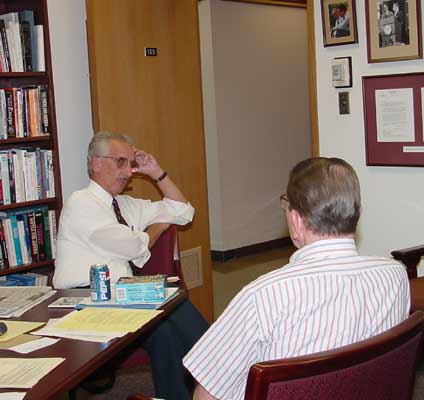 Al: Do you see any resolution to the regional
conflict? Al: Do you see any resolution to the regional
conflict?
Paul: I have to say, I am more optimistic than
most people for this reason: when I was first over there as a young journalist,
Arab leaders wouldn't use the word "Israel." Now, you have Egypt and
Jordan having recognized Israel. The Crown Prince of Saudi Arabia says
that he wants to work out a peace agreement. There are positive signs.
The tragedy is that they are just going back and forth with their violence.
Al: I would like to get your perspective on the
business ethics issue.
Paul: We saw all the problems with Enron. Enron was
seventy-sixth among the corporations in their contributions to members of the
House and Senate. John Ashcroft got over $60,000 in two campaigns from Enron.
I don't think John or the others are going to favor Enron now simply because of
all the publicity, but what about the seventy-five corporations that don't get
the publicity who are asking for a tax break here or a little something there?
There is an obligation not to do just what is popular, but to do what's right.
The pandering to big contributors is bad, but pandering to public opinion is bad
too.
Al: You ran for the Democratic nomination for
president in '88. What if you had won and then went on to become president? Do
you ever wonder what your presidency would have been like?
Paul: One of the things I resolved in my own mind was
if I ever got there, I would be like Harry Truman. He just did what he thought
was right. If you just serve one term, make it a good term. If you step on
powerful toes, you step on powerful toes. I think that is what leadership
really is about.
 Al: You have always been considered one of the most
effective of all legislators in the Senate. How do you account for that success
of leadership and getting things done?
Al: You have always been considered one of the most
effective of all legislators in the Senate. How do you account for that success
of leadership and getting things done?
Paul: I think the big thing is you have to be willing
to let others get credit. Ronald Reagan proposed to the nation to drop the Job Corps, and
so I drafted a bill, an amendment, to keep it, but you had a majority of
Republicans in the Senate, and so I went to the Republican Senator from
Pennsylvania, Arlen Specter, and I said I could introduce this, but the chances of it passing
are less than if you introduce it, so why don't we make it your amendment and I
will be a co-sponsor. I will get every Democratic vote, you get at least five
Republican votes and we will save the Job Corps. He got more votes. I don't remember how
many votes we got, but he got more than the five. Had I been on an ego
trip, I just wouldn't have gotten the job done.
 Al: If you had the ear of George Bush today, what
would you be whispering in his ear?
Al: If you had the ear of George Bush today, what
would you be whispering in his ear?
Paul: Strangely, I had that opportunity. Bush was
inaugurated on a Saturday, and on Friday night, I got a phone call saying the
President-elect wanted to meet with a few Democrats to talk about how he could
work with them and would I come to Washington. I said if there are going to be
thirty or forty people there, frankly, I am not interested coming. They said
no, there are only going to be five or six. So, I said ok; I would come.
Al: Who else was there?
Paul: Bob Strauss, John Glenn, Jody Powell, Dick Moe,
and Bill Gray were also there. Anyway, we had a meeting, and we all got in a
few words. I have to say that he listened and took notes. I think the fact
that he had the meeting was significant, but I said to him, "The most important
decision you are going to make is who is the next member of the US Supreme
Court. Don't make it quickly. Consult with Democrats, get someone where there
is a consensus that this person would be a good member of the US Supreme
Court." I think we may have three members of the Court stepping down. That is
going to shape our future in a huge way.
The second thing I told the President was to
listen to people who really have some background on foreign policy and don't let
the domestic agenda dictate how we handle foreign policy.
Al: Do you think he listened?
Paul: Well, I think he listened that day, but he has
so many people telling him things. I know his parents reasonably well, but I
have only met him on a few occasions, and then we had that one meeting.
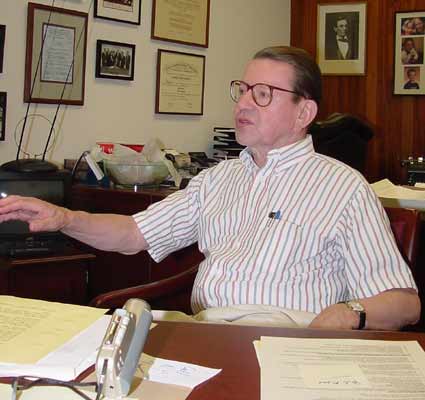 Al: Another issue on which you have done a great deal
of work is on the death penalty. I would like you to speak to my readers about
this issue.
Al: Another issue on which you have done a great deal
of work is on the death penalty. I would like you to speak to my readers about
this issue.
Paul: This morning's newspaper has a statement about
Turkey abandoning the death penalty so that they can get in the European Union.
The US couldn't even get into the EU. One hundred and six nations either don't
have the death penalty or don't use it-almost all of them democracies. The rest
of the nations are dictatorships that still use it. We are on the side of the
dictatorships!?! In the US, we have twelve states that don't have the
death penalty and seven states that don't use it.
I ask people, "Do you feel safer in Texas, which has
executed about a quarter of the people executed in our country, than you do in Iowa?
Or, do you feel safer in South Dakota, which has the death penalty than you do
in North Dakota, which doesn't have it?
It's kind of ridiculous. I asked a class, how many
of you here favor the death penalty? Just about, everyone raised his or
her hand. Then I asked how many of them think it is a deterrent to murder? Not a person
raised a hand. If it is not a deterrent, then the answer is that we do it
for revenge. Government shouldn't be in the business of revenge.
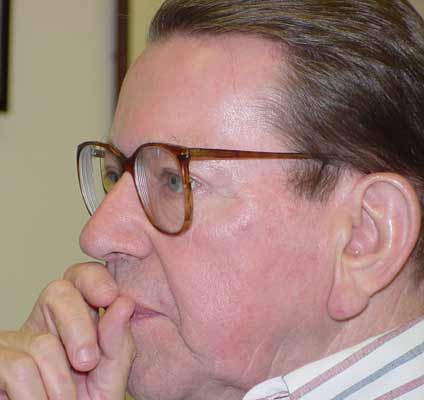 Among other
things, it is very costly. It costs much more to execute someone than to keep
them in prison for the rest of their lives. The government spent $13.8 for
Timothy McVeigh's defense. When you add the prosecution costs and all the time
that the FBI and others had devoted to this, when they could have been out
working on drug problems or other real problems. It is just an irrational way
to do things-especially, when you consider the fact that sometimes innocent
people are killed. I had a debate with Justice Scalia at the University of
Chicago on the death penalty. He started off by saying this is just my personal
opinion, and it doesn't mean this is how I would vote on the Supreme Court, but
of course we know it is exactly how he voted on the Supreme Court. I mentioned
that innocent people are killed. He said that innocent people are incarcerated
also. Therefore, should we do away with our prisons? Well, there is a slight
difference between taking someone's life and putting them in prison where they
still have a chance to prove their innocence. Among other
things, it is very costly. It costs much more to execute someone than to keep
them in prison for the rest of their lives. The government spent $13.8 for
Timothy McVeigh's defense. When you add the prosecution costs and all the time
that the FBI and others had devoted to this, when they could have been out
working on drug problems or other real problems. It is just an irrational way
to do things-especially, when you consider the fact that sometimes innocent
people are killed. I had a debate with Justice Scalia at the University of
Chicago on the death penalty. He started off by saying this is just my personal
opinion, and it doesn't mean this is how I would vote on the Supreme Court, but
of course we know it is exactly how he voted on the Supreme Court. I mentioned
that innocent people are killed. He said that innocent people are incarcerated
also. Therefore, should we do away with our prisons? Well, there is a slight
difference between taking someone's life and putting them in prison where they
still have a chance to prove their innocence.
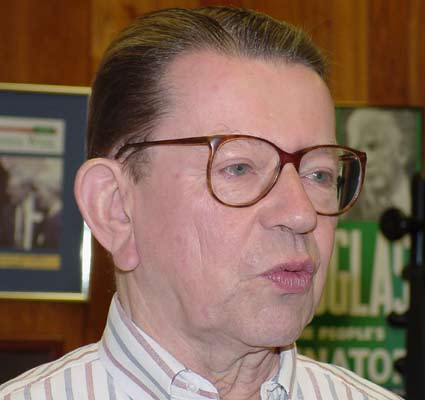 Al: I teach a philosophy class, and it amazes
me how militant my students are on the death issue and some of those other volatile
issues.
Al: I teach a philosophy class, and it amazes
me how militant my students are on the death issue and some of those other volatile
issues.
Paul: The Washington magazine, Roll Call, said
that one of the sure seats for the Republican side is Paul Simon's seat,
because I had taken a stand to oppose the death penalty and everybody was
talking about tax cuts. I said that we either ought to be talking about tax
increases or cutting spending. We shouldn't be borrowing from our children.
Another issue was that I led the opposition on the Constitutional Amendment on
burning the flag. Each year, we have a couple of Americans who burn a flag. We
trivialize the Constitution when we consider making it an amendment not to burn
the flag. When I ran against Lynn Martin, she would always bring up the death
penalty. There is no question that she was on the popular side of that issue,
but the Senate is about leadership. I told the voters, "If you want somebody
who is going to lead, and maybe not do the popular thing, then vote for me." I
ended up getting the biggest plurality of any candidate for senator or governor
of either political party in the nation.
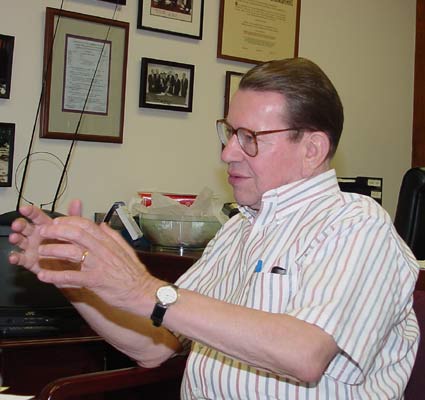 Al: You have had a long and distinguished career in
public service ..What is the meaning of public service or life as you see it?
Al: You have had a long and distinguished career in
public service ..What is the meaning of public service or life as you see it?
Paul: I have a friend who says life is like a bucket
of water. You put your hand in, and you pull it out without leaving any mark.
I couldn't disagree more. I think what gives satisfaction to life is helping people. That is my basic philosophy. The rich and the
powerful are going to make out all right by themselves. What you have to do is
help the people who don't have someone rich and powerful helping them.
There is a girl, Melannie Velez
is her name. Her family contacted me. She has cystic fibrosis, her parents
brought her to the US from Chile. They
didn't know what was wrong with her, but she was very sick. She's eleven-years
old, a bright little girl who wants to become a librarian, but she needs a lung
transplant, which costs $450,000. I won't go into all the details, but we
finally have her on the list now. Because she is not an American citizen,
Medicaid or anything like that would not cover it. When you see this little
girl, you know that somehow you have to help her.
Al: It's
interesting. That is the British attitude about health. I went to school for a
year at the University of Edinburgh in Scotland. I was intrigued by their
national health system. If you get to their shores, medical treatment is given
to you without charge-expect for a very small co-pay.
Paul: They did a poll in Canada about three
years ago that asked whether they were satisfied with the their health system.
Fifty-six percent said yes, not a good figure, but when asked if they preferred
the US system, only three
percent wanted that. Almost once a week, somebody is contacting me on some
kind of a health related problem where they don't have insurance and in this
wealthy country.
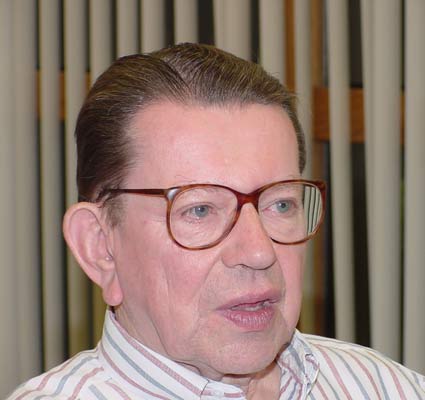 Al: This is a politically explosive question, but I
would also like your thoughts on the "under God" issue in the Pledge of
Allegiance. The separation of church and state is a difficult issue for my
students to work through.
Al: This is a politically explosive question, but I
would also like your thoughts on the "under God" issue in the Pledge of
Allegiance. The separation of church and state is a difficult issue for my
students to work through.
Paul: It's a fine line, and we will always be
struggling with this. I'm just finishing a book manuscript right now where I
came across a message Ulysses Grant sent to Congress. He talks about separation
of church and state and the problem of doing so. There is not absolute
separation if the local Methodist church is on fire, no one says that you can't call
up the fire department. I haven't heard anyone say that we should change the
name of St. Louis, St. Paul, or Los Angeles. However, we have to be very, very
careful. Strangely, at least on paper, we are one of the most religious nations
in the world, but we don't want the religious community running government nor
do we want government running the religious community. I think there are ways
of teaching about religion in schools. The National Association of
Evangelicals, the ACLU, and others have agreed on courses developed by the First
Amendment Center in Vanderbilt-that's meaningful. But, putting the Ten
Commandments on the wall of a classroom, doesn't stop someone from committing
murder.
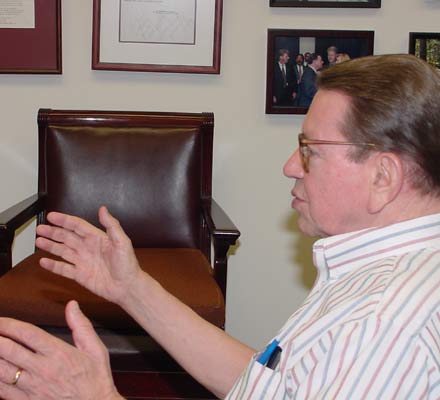 Al: Here is another one of those hot button
items-school prayer. What are your thoughts on this issue?
Al: Here is another one of those hot button
items-school prayer. What are your thoughts on this issue?
Paul: Dan Glickman, the former Secretary of
Agriculture, is Jewish and grew up in Wichita. He told me that when he was in
the fourth grade every morning he would be excused from the classroom during the
prayer and then he would be brought back in. Every morning Danny Glickman was
told "you are different" and all the other boys and girls were being told that he was
different. That shouldn't happen. We shouldn't expect government to do what we
should do in our homes, churches, synagogues, mosques.
Al: Before I let you get back to your other duties,
please, give me the history of you and the bowtie. Incidentally, this is the
very first time that I have ever seen you without one. You aren't even wearing
a tie.
Paul: I was running for the state legislature and
happened to wear one for about three days. One of the newspapers identified me
as "the candidate with the bowtie." I thought, what the heck! Before I retired
from the Senate, I was rushing to get to the floor of the Senate. I got on the
subway that goes between my office and the Capitol. There's Jesse Helms wearing
a bowtie, and I said, "Jesse, you look unusually good today." He said, "This is
first time in my life I have ever worn one." I should have known there was
something going on! When I got to the floor, nearly all my colleagues were
wearing bowties-even Barbara Boxer was wearing one.
 Al: I want to thank you for your time and willingness
to do this interview. It has been my pleasure. Perhaps next time, you will be
wearing your trademark bowtie.
Al: I want to thank you for your time and willingness
to do this interview. It has been my pleasure. Perhaps next time, you will be
wearing your trademark bowtie.
Paul: I'll look forward to it.
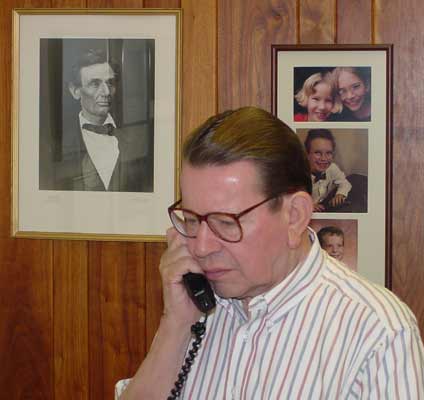
A personal observation:
During the hour interview, Paul received several calls
from all over the nation to get his advice or his endorsement on various
national policy issues. Many people wanted to know what Simon
says and thinks on a whole range of issues. To read more about the
interview, click on this link:
Simon
Says...
8/6/02
|








 Al: Paul, I really appreciate being able to sit down
and talk. I have followed your long and storied career. I look forward to this
interview.
Al: Paul, I really appreciate being able to sit down
and talk. I have followed your long and storied career. I look forward to this
interview. Al: I was listening to NPR coming here today, and
they were talking about the latest commotion in China regarding Taiwan. It
struck me how ironic it is that the Chinese have absolutely no business in
Tibet, but they are there. On the other hand, Taiwan should be a part of China,
but they aren't. Washington supports the latter and doesn't the former. It is
interesting how the US gets into these strange anachronisms.
Al: I was listening to NPR coming here today, and
they were talking about the latest commotion in China regarding Taiwan. It
struck me how ironic it is that the Chinese have absolutely no business in
Tibet, but they are there. On the other hand, Taiwan should be a part of China,
but they aren't. Washington supports the latter and doesn't the former. It is
interesting how the US gets into these strange anachronisms.  Al: What would you be saying in the Senate if you
were still there?
Al: What would you be saying in the Senate if you
were still there?  Al: I would like to broaden the question: I would
like to have your thoughts on the war in Afghanistan and the war on terrorism,
censorship, and all the detainees.
Al: I would like to broaden the question: I would
like to have your thoughts on the war in Afghanistan and the war on terrorism,
censorship, and all the detainees.  Al: Do you see any resolution to the regional
conflict?
Al: Do you see any resolution to the regional
conflict? Al: You have always been considered one of the most
effective of all legislators in the Senate. How do you account for that success
of leadership and getting things done?
Al: You have always been considered one of the most
effective of all legislators in the Senate. How do you account for that success
of leadership and getting things done? Al: If you had the ear of George Bush today, what
would you be whispering in his ear?
Al: If you had the ear of George Bush today, what
would you be whispering in his ear? Al: Another issue on which you have done a great deal
of work is on the death penalty. I would like you to speak to my readers about
this issue.
Al: Another issue on which you have done a great deal
of work is on the death penalty. I would like you to speak to my readers about
this issue.  Among other
things, it is very costly. It costs much more to execute someone than to keep
them in prison for the rest of their lives. The government spent $13.8 for
Timothy McVeigh's defense. When you add the prosecution costs and all the time
that the FBI and others had devoted to this, when they could have been out
working on drug problems or other real problems. It is just an irrational way
to do things-especially, when you consider the fact that sometimes innocent
people are killed. I had a debate with Justice Scalia at the University of
Chicago on the death penalty. He started off by saying this is just my personal
opinion, and it doesn't mean this is how I would vote on the Supreme Court, but
of course we know it is exactly how he voted on the Supreme Court. I mentioned
that innocent people are killed. He said that innocent people are incarcerated
also. Therefore, should we do away with our prisons? Well, there is a slight
difference between taking someone's life and putting them in prison where they
still have a chance to prove their innocence.
Among other
things, it is very costly. It costs much more to execute someone than to keep
them in prison for the rest of their lives. The government spent $13.8 for
Timothy McVeigh's defense. When you add the prosecution costs and all the time
that the FBI and others had devoted to this, when they could have been out
working on drug problems or other real problems. It is just an irrational way
to do things-especially, when you consider the fact that sometimes innocent
people are killed. I had a debate with Justice Scalia at the University of
Chicago on the death penalty. He started off by saying this is just my personal
opinion, and it doesn't mean this is how I would vote on the Supreme Court, but
of course we know it is exactly how he voted on the Supreme Court. I mentioned
that innocent people are killed. He said that innocent people are incarcerated
also. Therefore, should we do away with our prisons? Well, there is a slight
difference between taking someone's life and putting them in prison where they
still have a chance to prove their innocence. Al: I teach a philosophy class, and it amazes
me how militant my students are on the death issue and some of those other volatile
issues.
Al: I teach a philosophy class, and it amazes
me how militant my students are on the death issue and some of those other volatile
issues.  Al: You have had a long and distinguished career in
public service ..What is the meaning of public service or life as you see it?
Al: You have had a long and distinguished career in
public service ..What is the meaning of public service or life as you see it?
 Al: This is a politically explosive question, but I
would also like your thoughts on the "under God" issue in the Pledge of
Allegiance. The separation of church and state is a difficult issue for my
students to work through.
Al: This is a politically explosive question, but I
would also like your thoughts on the "under God" issue in the Pledge of
Allegiance. The separation of church and state is a difficult issue for my
students to work through.  Al: Here is another one of those hot button
items-school prayer. What are your thoughts on this issue?
Al: Here is another one of those hot button
items-school prayer. What are your thoughts on this issue?
 Al: I want to thank you for your time and willingness
to do this interview. It has been my pleasure. Perhaps next time, you will be
wearing your trademark bowtie.
Al: I want to thank you for your time and willingness
to do this interview. It has been my pleasure. Perhaps next time, you will be
wearing your trademark bowtie.